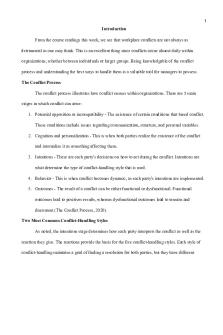BUS 5113 UNIT 4 Portfolio Activity PDF

| Title | BUS 5113 UNIT 4 Portfolio Activity |
|---|---|
| Author | Trust Emma |
| Course | Organizational Theory and Behavior |
| Institution | University of the People |
| Pages | 3 |
| File Size | 76.7 KB |
| File Type | |
| Total Downloads | 34 |
| Total Views | 102 |
Summary
Work Scenarios Scale Response: 1. B 2. A 3. B 4. A 5. AMy current superior has gained my trust. I tend to believe everything he tells me as I have always found them to be true even at times when I queried them. However, I chose “sometimes” as my response because prior to my current superior, I never...
Description
Work Scenarios Scale Response: 1. B 2. A 3. B 4. A 5. A
My current superior has gained my trust. I tend to believe everything he tells me as I have always found them to be true even at times when I queried them. However, I chose “sometimes” as my response because prior to my current superior, I never believed everything my superiors told me as a result of eroded trusts in authority-based relationships. This affected my perception about people in higher authority. “In both your personal life and your work life, you’re bound to encounter people who take advantage of you, and these painful experiences can make you cynical” (Bingham, 2017). My current superior gained my trust by explaining the reasons behind his decisions most times. I found this appealing and it created an open communication channel between us. Naturally, I question thoughts. I believe this is necessary as humans are imperfect and make mistakes. Even with the best of intentions, we pass information in an unclear manner at times. I have observed that without querying the information received, the receiver might have a different interpretation of the data from the intended message of the sender. I also believe that sometimes, people share information based on the situation and how comfortable they are at the moment. This makes me query any information received even when they are well-intentioned.
In communication, we each have our own filters. Personal and particular experiences color our perceptions, how people view the world and how they communicate (Lumen Learning,
n.d.-b). I always filter and process details to my own advantage. Every organization has their own language. Most times they mistake that everyone speaks their language even when the individual has just joined them. So, I tend to filter to my own advantage at first before I understand the language of the organization in other to communicate effectively with superiors and subordinates alike. This process of filtering could either be a barrier or a gateway depending on the receiver’s personal experiences.
I perceive that information is not always shared efficiently across my organization. This perception is based on the response times associated with certain decisions at the senior management level. Top management tend to delay with decisions and sometimes miss out on certain cases presented to them for their feedback until these are referred to them again. I perceive that this current situation is as a result of information overload. It clearly does not have to do with barriers such as stereotypes and prejudice.
I am always able to achieve a compromise in the organization because I respect other people’s views. Open and honest communication is a healthy and effective style of communication. It is neither aggressive, manipulative, nor passive. I find that this style of communication is easier developed from the family unit (the home). Few colleagues whom I have come across having this assertive style of communication, shared similar family backgrounds.
In managing rumors in an organization, understanding that it is not something that can be abolished entirely helps. People will always share information in informal means. Dispelling any untrue information on time before it spreads in a business environment and creating an
open-door policy between the management and employees helps leaders to effectively manage grapevines.
REFERENCES Bingham, S. (2017, May 3). If Employees Don’t Trust You, It’s Up to You to Fix It. Harvard Business Review. https://hbr.org/2017/01/if-employees-dont-trust-you-its-up-to-you-to-fix-it Lumen Learning. (n.d.-b). Barriers to Effective Communication | Principles of Management. Lumen. Retrieved July 17, 2020, from https://courses.lumenlearning.com/wmprinciplesofmanagement/chapter/barriers-to-effective-communication/...
Similar Free PDFs

BUS 5113 Portfolio 2
- 3 Pages

BUS 5113 Portfolio Unit 3 Answer
- 5 Pages

BUS 5113 - Unit 6 Discussion
- 4 Pages

BUS 5113 - Unit 5 Discussion
- 3 Pages

BUS 5113 Discussion Unit 7
- 3 Pages

Portfolio Activity Unit 3
- 3 Pages

BUS 5910 Portfolio # 4
- 4 Pages

BUS 5110 Unit 8 portfolio
- 2 Pages

Portfolio assignment unit- 4
- 3 Pages
Popular Institutions
- Tinajero National High School - Annex
- Politeknik Caltex Riau
- Yokohama City University
- SGT University
- University of Al-Qadisiyah
- Divine Word College of Vigan
- Techniek College Rotterdam
- Universidade de Santiago
- Universiti Teknologi MARA Cawangan Johor Kampus Pasir Gudang
- Poltekkes Kemenkes Yogyakarta
- Baguio City National High School
- Colegio san marcos
- preparatoria uno
- Centro de Bachillerato Tecnológico Industrial y de Servicios No. 107
- Dalian Maritime University
- Quang Trung Secondary School
- Colegio Tecnológico en Informática
- Corporación Regional de Educación Superior
- Grupo CEDVA
- Dar Al Uloom University
- Centro de Estudios Preuniversitarios de la Universidad Nacional de Ingeniería
- 上智大学
- Aakash International School, Nuna Majara
- San Felipe Neri Catholic School
- Kang Chiao International School - New Taipei City
- Misamis Occidental National High School
- Institución Educativa Escuela Normal Juan Ladrilleros
- Kolehiyo ng Pantukan
- Batanes State College
- Instituto Continental
- Sekolah Menengah Kejuruan Kesehatan Kaltara (Tarakan)
- Colegio de La Inmaculada Concepcion - Cebu






